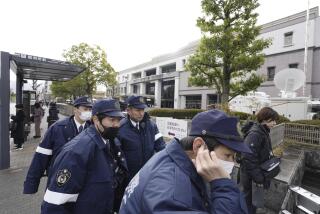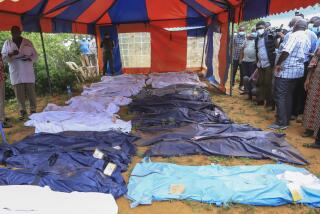Japan Cult Leader, Aides Indicted in Fatal Gas Attack
- Share via
TOKYO — Prosecutors indicted cult leader Shoko Asahara and six aides Tuesday on charges of murder and attempted murder, bringing to a climax the investigations of a March nerve gas attack on the subway system here.
Nine other cult members were formally charged with carrying out preparations for murder by making the sarin poison gas and assembling the facilities to produce it.
Although 13 more suspects are expected to be indicted and a search continues for seven sect members for whom arrest warrants have been issued, Home Affairs Minister Hiromu Nonaka said filing of the official charges wrapped up the major part of the investigation into the March 20 subway attack.
Prosecutors charged Asahara and his followers with killing 11 people and attempting to murder 1,168, two of whom remain in a coma.
A 12th person later died, but prosecutors said they could not establish a direct link between the gas and that death.
More than 5,500 people aboard five trains on three lines were sickened as sarin gas was released from plastic bags that were punctured with umbrella tips, allegedly by sect members, prosecutors said, adding that they may later increase the number of attempted murder charges in the indictment.
Nonaka added that authorities have yet to clear up a series of crimes in which sect members are believed to have been involved.
The cases include a 1989 kidnaping of an anti-cult lawyer, his wife and baby son; a sarin attack in the city of Matsumoto in June, 1994, in which seven people were killed and 600 afflicted; the kidnaping and suspected murder of a notary public Feb. 28, and the shooting of National Police Agency Chief Takaji Kunimatsu on March 30.
The cult is also suspected of illegally manufacturing chemical, biological and conventional weapons and producing drugs.
The subway attack shook to the roots Japan’s longstanding confidence in its public safety, while revelations of other crimes allegedly committed by highly educated cult followers have prompted a widespread questioning of the norms of Japanese society.
No date was set for trials, but prosecutors reportedly hope that they can begin by year’s end.
The courts are expected to deny bail to the bearded, partially blind 40-year-old doomsday cult leader on the grounds that he would destroy evidence if freed.
The charges against him and his six aides carry a maximum penalty of death by hanging, while engaging in preparations for murder is punishable by a maximum sentence of life imprisonment.
Tortuous trial procedures and exhaustive appeals, however, were expected to turn judicial proceedings into a court marathon consuming years, and perhaps even decades.
In Japan, panels of judges preside over trials without a jury, and hearings are held only once every several months.
Either side can appeal verdicts, first to a High Court and then to the Supreme Court.
Last December, a poll conducted by the prime minister’s office showed that 74% of the people considered the death penalty to be “inevitable in some cases.”
Although four consecutive justice ministers implemented a de facto moratorium on the death penalty by refusing to sign execution orders from 1989 to 1992, seven hangings were carried out in 1993, and two people were executed last year.
The sect’s headquarters in Tokyo issued a statement calling the indictments “truly regrettable.”
Asahara, who has denied involvement in the subway attack and has refused to answer questions about it, was quoted by police as saying that he had expected the indictment.
“I know that the state is using its official power trying to destroy Aum Supreme Truth,” he reportedly said.
More to Read
Sign up for Essential California
The most important California stories and recommendations in your inbox every morning.
You may occasionally receive promotional content from the Los Angeles Times.










